Harnessing the Power of Sports to Help Young People Thrive
- Leapetswe (Leps) Malete, Ph.D.
- Associate Professor and Coordinator of Global Initiatives, Department of Kinesiology
- Director, International Research on Youth Sport, Physical Activity and Health Lab
- College of Education
Project Overview
- Research and capacity building to empower young people by teaching life skills through sports and physical activity.
- These life skills include time management, goal setting, teamwork, compassion, confidence, and connection with others.
Products/Outcomes
- Student input to refine youth program and make it sustainable in the future.
- An evaluation of the impact of intentionally incorporating social-emotional learning and life skills into activities using questionnaires and assessments.
Partners
- Jon Horford, founder and director, Lansing Youth Development Program
- Flint Center for Educational Excellence
- Lansing Public Schools
- Michigan Health Endowment Fund
- MSU Alliance for African Partnership
- University of Botswana and Infers Group
- University of Dar es Salaam, Tanzania
- University of Ghana and ADANU
- University of Nigeria - Nsukka (UNN) and UNN Medical School in Enugu
Form(s) of Engagement
- Community-Engaged Research
- Community-Engaged Teaching and Learning
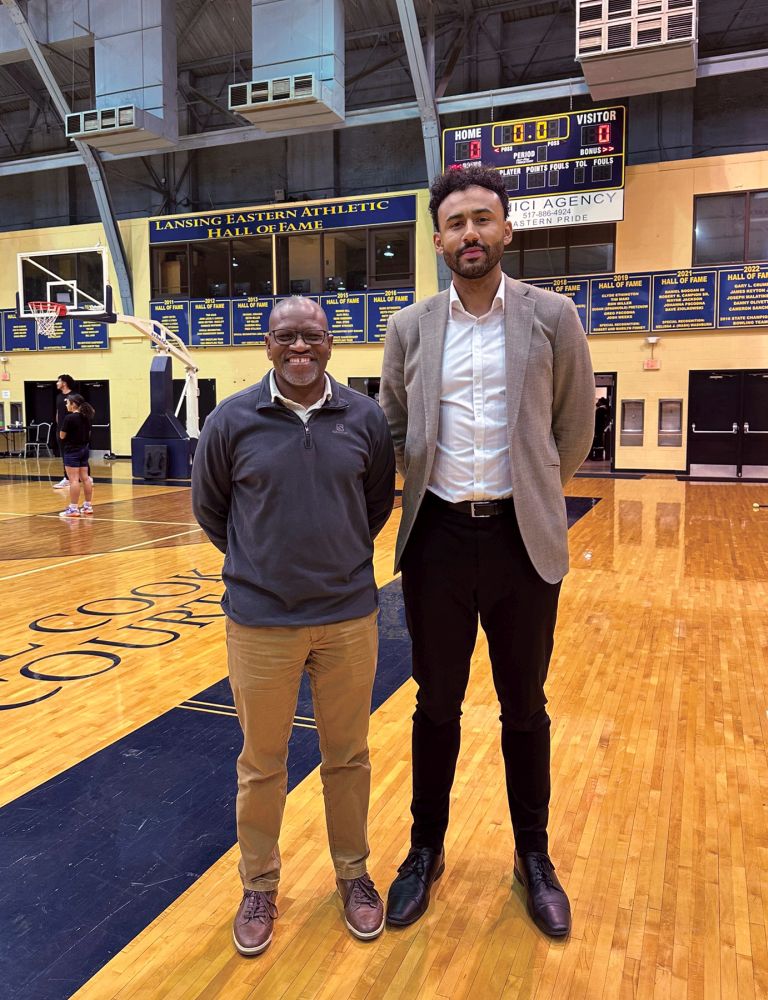
Leps Malete, an associate professor of kinesiology at MSU, and Jon Horford, founder of the Lansing Youth Development Program, struck up a partnership after faculty toured the Don Johnson Fieldhouse in Lansing.
The squeak of sneakers on the gym floor means it’s game on at the Don Johnson Fieldhouse in Lansing.
On any given weekday, some 120 Lansing Public School students drop in to play basketball, soccer or volleyball, participate in structured training sessions, lift weights, participate in esports, and more. Kids can also take advantage of tutoring, free weekly haircuts, a meal, and art projects.
But the Lansing Youth Development Program is not just a place for young people to go after school – it’s a place for them to grow. “It’s really a habit development program,” said founder Jon Horford, who sees sports as a gateway to goal setting, teamwork, time management, and overcoming adversity. “We are working to build habits that will be beneficial to these students in all aspects of life.”
When faculty from Michigan State University toured the program last summer, Horford extended an invitation. “I had mentioned to all of them we are looking for any kind of partnerships that would be beneficial to the students,” he recalled. Leapetswe (Leps) Malete, an MSU associate professor of kinesiology, took him up on the offer.
Malete remembers the interaction well. Not only was Horford welcoming, but the program aligned with the focus of Malete’s research on the connection between youth sports and physical activity and the development of social-emotional learning and life skills.
“I was truly impressed by the comprehensiveness of the program and the potential power to transform youth development and educational outcomes,” said Malete. “The program is exactly what I would like to see happen in knowledge-to-action and community-engaged scholarship, where schools, universities, communities, nonprofits, and industry work together to enhance youth development outcomes and transform communities.”
Sports as a Vehicle for Youth Empowerment
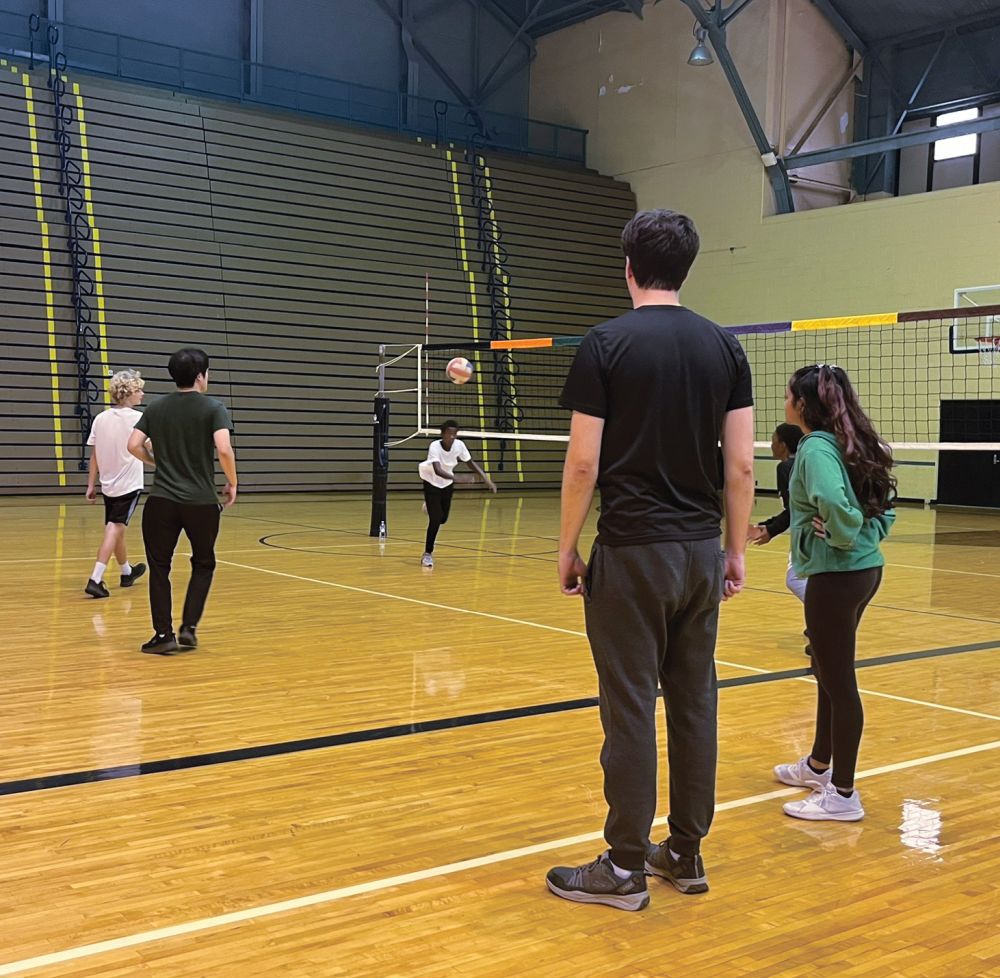
MSU students on Malete’s research team layer life lessons into sport activities like volleyball, soccer, and basketball at an after-school program for Lansing high school students.
Malete has devoted much of his career to collaborating with schools and communities—across Africa and, more recently, in Flint and Lansing—to use sport as a vehicle for youth empowerment.
“My work really is focusing on lessons that can be harnessed from sport and physical activity,” Malete said. “I have a strong interest in being intentional about using the skills and competencies that young people learn from sport in order to empower them in other spheres of life.”
His research is rooted in personal experience. Growing up in Botswana, Malete played volleyball in high school and at the University of Botswana, eventually joining a national team. “It was these experiences in sports that exposed me to the power of sports in impacting people’s lives,” he said. “I learned time management. I learned self-discipline. I learned goal setting and team building.”
These interests led him to become a lecturer in sport and exercise psychology at the University of Botswana. Malete earned a master’s and doctorate in kinesiology at MSU, then returned to Botswana to continue teaching, mentorship, research, and outreach in sport and exercise psychology. In 2016, he returned to Michigan State to join the faculty of the Department of Kinesiology.
A Partnership in Botswana
Malete directs the International Research on Youth Sport, Physical Activity and Health Lab (IRYSPAH). He has collaborated with MSU faculty and university and community partners in Botswana, Kenya, Ghana, Nigeria, and Tanzania on projects that focus on the impact of involvement in sports and physical activity on outcomes such as entrepreneurship, youth life skills, and health and well-being. This work has been funded by MSU’s Alliance for African Partnership and other agencies including USAID and the National Research Foundation of South Africa.
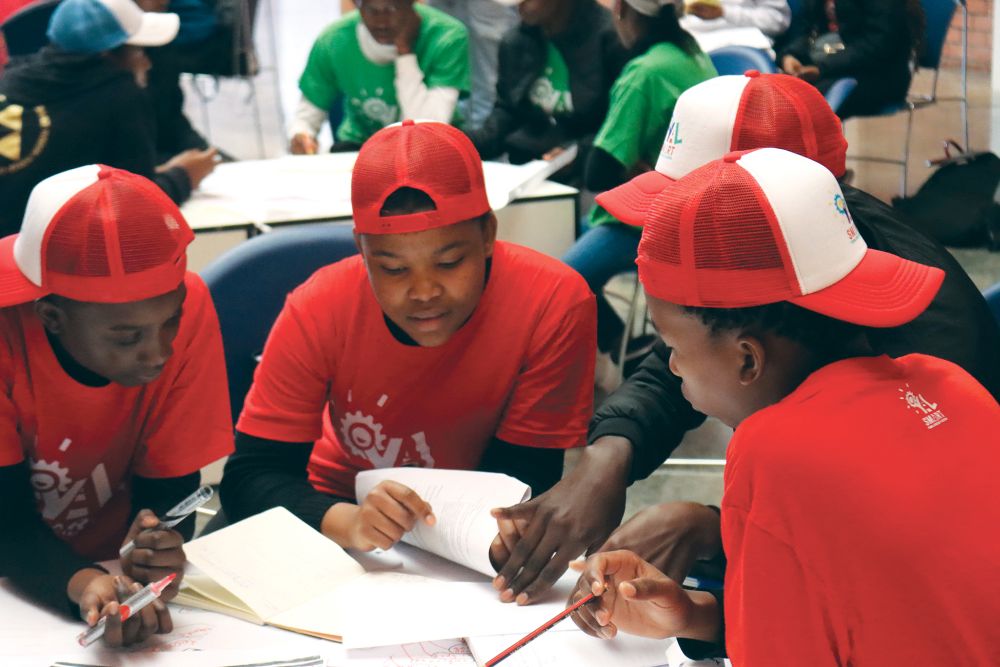
High school students in Botswana learn and brainstorm about ways to improve infrastructure and mobility innovations to promote physical activity and well-being as part of the Y’AL-SMART project designed to empower young African leaders.
Credit: Courtesy of Leps Malete
The most recent study examined the effects of “coaching autonomy” on young people ages 12-20 in Botswana. In lay terms, coaching autonomy refers to an approach that encourages young people “to feel empowered, to feel capable of charting their own direction, and be more in control of their behaviors,” Malete said.
Malete and his research team collaborated with high schools to measure the impact of coaching behaviors on young people. The study found that coaching in a way that encouraged young people to feel empowered led to the acquisition of life skills related to sports such as goal setting and teamwork, along with other character-related attributes like compassion, confidence, and connection.
From Africa to Michigan
Since returning to MSU in 2016, Malete has sought to replicate his work in Africa in the United States, particularly in Michigan. “Youth in those countries face similar challenges and have similar aspirations,” he said. Under-resourced communities in both places lack access to sports programming and facilities.
Horford, a lobbyist and former college and professional basketball player, founded the Lansing Student Development Program in 2022 to close that gap. “The idea is to remove all barriers and give access to training, tutoring, food, transportation, just a safe environment that kids can come to every day,” he said.
“It’s not even about becoming a better athlete,” he added. “It’s about your mental health, your physical health. The goal is for these students to be able to interact with each other in a more healthy way, to be able to deal with adversity in a more healthy way, to be able to process their emotions in a more healthy way.”
The synergies between the program and IRYSPAH became evident during the tour, Malete recalled. “It’s really a fantastic program for youth empowerment that I think needs to be replicated across the country,” he said.
Malete had been seeking community partners in Michigan for a research project titled "Youth Activity and Well-Being: The Impact of a Community-Based Life Skills Development Program,” funded by the Michigan Health Endowment Fund.
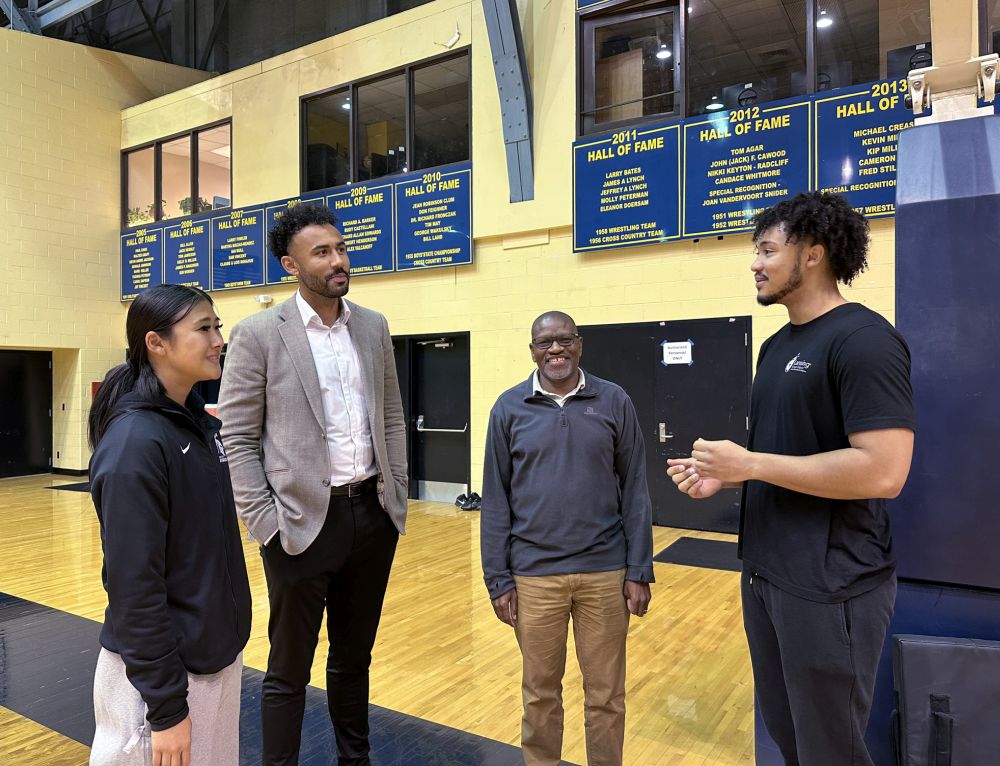
MSU student researchers work with Lansing Public School students alongside coaches and trainers. From left: Emily Hayashi, a first-year doctoral student, Jon Horford, Leps Malete, and trainer Josh Horford.
Before connecting with Horford, Malete and his team had partnered with the Flint Center for Educational Excellence to offer a summer program for 60 middle and high school students that linked sports and games with life skills. Pre- and post-participation survey data have not yet been analyzed, but students had positive things to say during a tour of MSU on the last day. “Some of the kids were saying, “I really liked this program. It helped me. Some said, ‘I want to come here and study,’” Malete recalled.
A Partnership in Lansing
This past fall, Malete invited Horford’s coaching staff to MSU to join Flint educators for a training program. Andrew MacIntosh, national director of leadership and education programs at the Ross Initiative for Sports Equality, presented a workshop on how to integrate social-emotional learning and life skills into coaching.
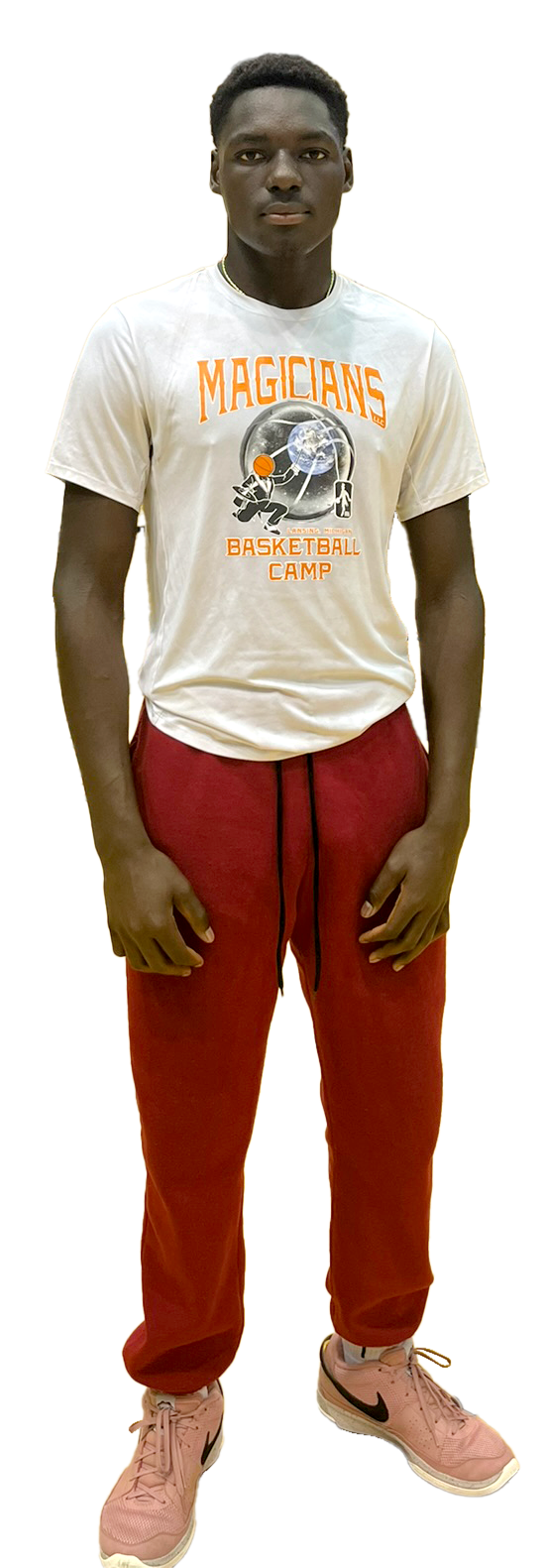
“I understand what it means to be part of a team, working together.”
– Yohana Koswara, an Eastern High School student who plans to study finance or business in college
Many of the coaches already do that informally, but Horford welcomed the opportunity to partner with Malete and his team. “They are helping us to be more intentional and more purposeful in the way we implement a lot of the social-emotional learning training,” he said. “[Coaches] realize there’s an actual method to it. This is how you get kids to buy in and adopt a lot of these lessons that you are trying to teach through sports, or strength conditioning, or tutoring.”
Malete and Horford, along with Spyridoula Vazou, a co-investigator and associate professor of kinesiology, collaborated on a plan for teachers and coaches to implement the program. Students on Malete and Vazou’s research team visit the fieldhouse next to Lansing’s Eastern High School four times per week, where they lead sessions and layer in social-emotional learning.
“We’re teaching a framework and not a structured curriculum,” said Malete. “Helping kids realize that they can develop confidence from engaging in the sport, working well with others, problem-solving skills, and critical thinking skills.”
The research team provides staff with a social-emotional learning checklist that they fill out each day. They also administered a pre-assessment with students prior to the program and planned a post-assessment after eight weeks to measure outcomes.
“The goals for us are to see young people developing strong social-emotional learning skills as part of their engagement in the program,” Malete said. “We’d like to see young people also doing well at school in terms of academic achievement.”
Malete is grateful to the Michigan Health Endowment Fund for providing the current funding. He is seeking funding to enhance the program in the spring. “The next phase of the plan is to have even more engagement,” he said, explaining that he would like to collect input from the coaches and the young people themselves about what works and what doesn’t.
‘A Platform to Thrive’
Back at the fieldhouse, Yohana Kaswara, 16, took a break from shooting baskets to talk about what he’s gained from participating in the youth development program. The Eastern High School varsity center has seen his game improve over the past two years, but he’s learned other valuable lessons as well.
“I understand what it means to be part of a team, working together,” he said. “It’s helped me communicate well with people.” Looking ahead, Kaswara plans to study finance or business in college.
Hearing stories like these—in the United States and in Africa—has been rewarding for Malete, who considers it a privilege to partner with organizations in both places.
Too often young people are viewed with a “deficit approach,” as somehow lacking competencies, he said. But Malete has seen firsthand “how talented they are and how this talent has not been given a platform to thrive.”
“They have the power to learn and empower themselves,” he said. “The idea is to look at them as people who can be helped with intentional programming to grow and become stronger, better, empowered individuals.”
- Written by Patricia Mish, University Outreach and Engagement